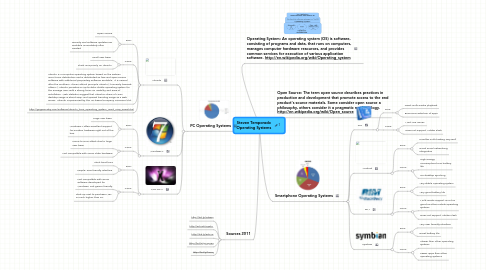
1. Operating System: An operating system (OS) is software, consisting of programs and data, that runs on computers, manages computer hardware resources, and provides common services for execution of various application software. http://en.wikipedia.org/wiki/Operating_system
2. PC Operating Systems
2.1. Ubuntu
2.1.1. Pros:
2.1.1.1. Open source
2.1.1.2. Security and software updates are available immediately after created
2.1.2. Cons:
2.1.2.1. Small user base
2.1.2.2. Flash runs poorly on Ubuntu
2.1.3. Ubuntu is a computer operating system based on the Debian GNU/Linux distribution and is distributed as free and open source software with additional proprietary software available. It is named after the Southern African ethical principle Ubuntu ("humanity towards others"). Ubuntu provides an up-to-date, stable operating system for the average user, with a strong focus on usability and ease of installation. Web statistics suggest that Ubuntu's share of Linux desktop usage is about 50%, and upward trending usage as a web server. Ubuntu is sponsored by the UK-based company Canonical Ltd.
2.1.4. http://gogeometry.com/software/ubuntu_linux_operating_system_mind_map_news.html
2.2. Windows 7
2.2.1. Pros:
2.2.1.1. Large user base
2.2.1.2. Windows 7 offers excellent support for modern hardware right out of the box
2.2.2. Cons:
2.2.2.1. Prone to virus attack due to large user base
2.2.2.2. Not compatible with some older hardware
2.3. Mac OS X
2.3.1. Pros:
2.3.1.1. Short boot time
2.3.1.2. Simple, user friendly interface
2.3.2. Cons:
2.3.2.1. Not compatible with some software developed for Windows, Not gamer friendly
2.3.2.2. Start-up cost to purchase Mac is much higher than PC
3. Sources 2011
3.1. http://bit.ly/anb8Iy
3.2. http://zd.net/9rpzh1
3.3. http://bit.ly/estv16
3.4. http://bit.ly/gMqUaS
3.5. http://bit.ly/fIo2cj
4. Open Source: The term open source describes practices in production and development that promote access to the end product's source materials. Some consider open source a philosophy, others consider it a pragmatic methodology. http://en.wikipedia.org/wiki/Open_source
5. Smartphone Operating Systems
5.1. iOS
5.1.1. Pros:
5.1.1.1. Great multi-media playback
5.1.1.2. Enormous selection of apps
5.1.2. Cons:
5.1.2.1. Must use iTunes
5.1.2.2. Does not support Adobe Flash
5.2. Android
5.2.1. Pros:
5.2.1.1. Handles multi-tasking very well
5.2.1.2. Good social networking integration
5.2.2. Cons:
5.2.2.1. High energy consumption/Poor battery life
5.2.2.2. No desktop synching
5.3. RIM
5.3.1. Pros:
5.3.1.1. Very stable operating system
5.3.1.2. Very good battery life
5.3.2. Cons:
5.3.2.1. Multi-media support is not as good as other mobile operating systems
5.3.2.2. Does not support Adobe Flash
5.4. Symbian
5.4.1. Pros:
5.4.1.1. Very user friendly interface
5.4.1.2. Great battery life
5.4.2. Cons:
5.4.2.1. Slower than other operating systems
5.4.2.2. Fewer apps than other operating systems
